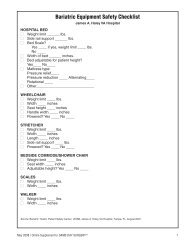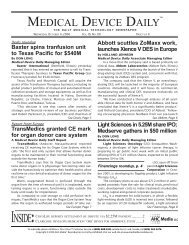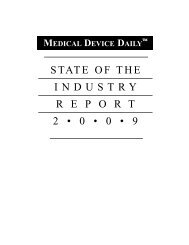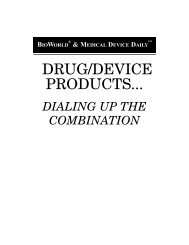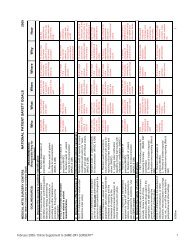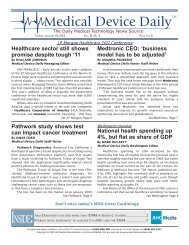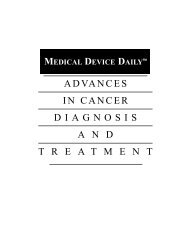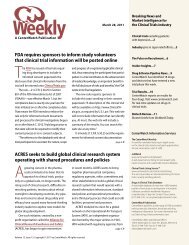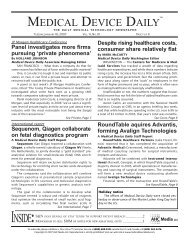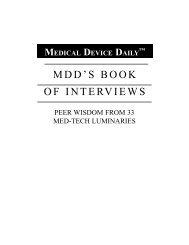MEDICAL DEVICE INNOVATION - Medical Device Daily
MEDICAL DEVICE INNOVATION - Medical Device Daily
MEDICAL DEVICE INNOVATION - Medical Device Daily
Create successful ePaper yourself
Turn your PDF publications into a flip-book with our unique Google optimized e-Paper software.
<strong>MEDICAL</strong> <strong>DEVICE</strong> <strong>INNOVATION</strong> 2010<br />
Broad-scope test aims to<br />
catch cancer before it starts<br />
By AMANDA PEDERSEN<br />
<strong>Medical</strong> <strong>Device</strong> <strong>Daily</strong> Staff Writer<br />
There are a number of good cancer tests designed to<br />
catch the disease as soon as it shows up, but one company<br />
believes it has found a way to detect signs of whole-body<br />
cancers long before the disease is even present.<br />
GlycoMeds (Phoenix) says its Cancer Test is a broad-scope<br />
test that detects conditions within the body that allow cancer<br />
cell growth prior to cancer cells being active.<br />
GlycoMeds’ Cancer Test employs a process that produces<br />
consistent measurements of the chemical composition<br />
of a person’s saliva, the company says. It is an at-home<br />
test designed to alert the user to the presence of conditions<br />
within their body that are conducive to the growth of 74%<br />
of all cancers, including breast, lung, kidney, colon, liver,<br />
bone and brain cancer. The kit does not measure pH, the<br />
company noted.<br />
Unlike certain other at-home diagnostics, the results of<br />
this test are not black-and-white, Roger Brown, PhD, CEO of<br />
GlycoMeds, told <strong>Medical</strong> <strong>Device</strong> <strong>Daily</strong>.<br />
“With our test it’s a gray-scale test, we don’t tell you<br />
that you have cancer or that you don’t have cancer, we just<br />
give you the likelihood,” he said.<br />
The test is not keyed for any specific type of cancer<br />
either, Brown said, but is more sensitive to cancers that<br />
affect the whole body, such as lung cancer. Not all cancers<br />
affect the whole body, he noted.<br />
With lung cancer, for example, the patient’s entire body<br />
is affected as their pH levels drop and their system slowly<br />
goes down. It can take years before the system will degrade<br />
to the point where the cancer will be detectable clinically,<br />
Brown said. While acknowledging that there are other tests<br />
that can catch cancer as soon as it shows up, he said doctors<br />
don’t currently have a decent way to detect ahead of<br />
time the patient’s likelihood of getting cancer.<br />
According to the company, the GlycoMeds Cancer Test<br />
works because most cancer cells live in a narrow pH range<br />
within the body. As long as the body’s system pH is outside<br />
that range, most cancer cells cannot survive.<br />
The GlycoMeds test measures the changes in a person’s<br />
fluidic system once a day for three days, averages<br />
those changes, and compares them to the changes a<br />
healthy person’s fluidic system would undergo. The measurement<br />
is then equated to a condition level on a scale of 0<br />
to 7, where 0 is healthy – no conditions conducive to the<br />
growth of whole-body cancer cells – and 7 has a prognosis<br />
of death.<br />
If the number reveals an active possibility of cancer<br />
(levels 4, 5 or 6), the person taking the test is advised to<br />
make an appointment with his or her doctor for further<br />
evaluation. But if the test shows cancer is not imminent<br />
61<br />
(levels 1, 2 or 3), the person taking the test can take corrective<br />
action to bring his or her system back to normal, thus<br />
inhibiting cancer cell growth.<br />
“If you’re a level 4 or a level 5 it doesn’t say ‘I have cancer’<br />
but it says ‘I better go to the doctor’,” Brown said.<br />
“Essentially the kit is just saying ‘maybe you ought to have<br />
an extra checkup this year.”<br />
Brown said the test instructs the consumer to take the<br />
saliva test three mornings in a row and average the results<br />
together because a lot of people have never taken a saliva<br />
test and the first time they take it they may drop it on the<br />
floor or accidentally do something else that could affect its<br />
accuracy. Hopefully, he said, by taking the average of three<br />
days’ worth of results, the test will produce a reasonably<br />
accurate result.<br />
“I wanted to keep it as simple as possible, but also as<br />
accurate as possible,” Brown said.<br />
If the test is being administered by a healthcare professional,<br />
Brown said supplemental instructions included in<br />
the kit say it is fine to use the results of just one sample<br />
because “they usually know what they’re doing.”<br />
The company said it is looking for a partner to license<br />
and market the Cancer Test Kit, which has not yet been presented<br />
to the FDA for comment.<br />
Brown said the Cancer Test has been in development<br />
since 2004. He said there has been very little research done<br />
on the causes of cancer vs. system condition. In 2004, however,<br />
there was a study done in which researchers linked a<br />
low pH system to cell conduciveness to viral cancers. The<br />
lower the system pH, the more susceptible the cells are to<br />
being turned into cancer cells, Brown noted.<br />
“I think it’s important from the point of view that a lot<br />
of people would like to know whether they’re at risk more<br />
than normal for cancer or not,” Brown said. He compared<br />
the Cancer Test to a popular at-home HIV test. “From the<br />
research we’ve done, there are more people that are concerned<br />
about whether or not they have cancer than there<br />
are people who want to know if they have AIDS or HIV.”<br />
In addition to the at-home HIV test that Brown mentioned,<br />
the Cancer Test joins a whole host of diagnostics<br />
that are being sold directly to consumers now, which are<br />
designed to tell people what their risk level is of developing<br />
a particular disease.<br />
(This story originally appeared in the Feb. 6, 2009, edition<br />
of <strong>Medical</strong> <strong>Device</strong> <strong>Daily</strong>)<br />
To subscribe, please call <strong>MEDICAL</strong> <strong>DEVICE</strong> DAILY Customer Service at (800) 888-3912 outside the U.S. and Canada, call (404) 262-5547.<br />
Copyright © 2010 AHC Media LLC. Reproduction is strictly prohibited.



